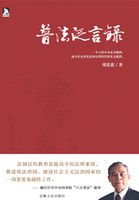Carrington's hostility to Ratcliffe was, however, mild, when compared with that felt by old Baron Jacobi. Why the baron should have taken so violent a prejudice it is not easy to explain, but a diplomatist and a senator are natural enemies, and Jacobi, as an avowed admirer of Mrs. Lee, found Ratcliffe in his way. This prejudiced and immoral old diplomatist despised and loathed an American senator as the type which, to his bleared European eyes, combined the utmost pragmatical self-assurance and overbearing temper with the narrowest education and the meanest personal experience that ever existed in any considerable government. As Baron Jacobi's country had no special relations with that of the United States, and its Legation at Washington was a mere job to create a place for Jacobi to fill, he had no occasion to disguise his personal antipathies, and he considered himself in some degree as having a mission to express that diplomatic contempt for the Senate which his colleagues, if they felt it, were obliged to conceal. He performed his duties with conscientious precision. He never missed an opportunity to thrust the sharp point of his dialectic rapier through the joints of the clumsy and hide-bound senatorial self-esteem. He delighted in skilfully exposing to Madeleine's eyes some new side of Ratcliffe's ignorance. His conversation at such times sparkled with historical allusions, quotations in half a dozen different languages, references to well-known facts which an old man's memory could not recall with precision in all their details, but with which the Honourable Senator was familiarly acquainted, and which he could readily supply. And his Voltairian face leered politely as he listened to Ratcliffe's reply, which showed invariable ignorance of common literature, art, and history. The climax of his triumph came one evening when Ratcliffe unluckily, tempted by some allusion to Moli鑢e which he thought he understood, made reference to the unfortunate influence of that great man on the religious opinions of his time. Jacobi, by a flash of inspiration, divined that he had confused Moli鑢e with Voltaire, and assuming a manner of extreme suavity, he put his victim on the rack, and tortured him with affected explanations and interrogations, until Madeleine was in a manner forced to interrupt and end the scene. But even when the senator was not to be lured into a trap, he could not escape assault. The baron in such a case would cross the lines and attack him on his own ground, as on one occasion, when Ratcliffe was defending his doctrine of party allegiance, Jacobi silenced him by sneering somewhat thus:
"Your principle is quite correct, Mr. Senator. I, too, like yourself, was once a good party man: my party was that of the Church; I was ultramontane.
Your party system is one of your thefts from our Church; your National Convention is our OEcumenic Council; you abdicate reason, as we do, before its decisions; and you yourself, Mr. Ratcliffe, you are a Cardinal. They are able men, those cardinals; I have known many; they were our best friends, but they were not reformers. Are you a reformer, Mr. Senator?"
Ratcliffe grew to dread and hate the old man, but all his ordinary tactics were powerless against this impenetrable eighteenth century cynic. If he resorted to his Congressional practise of browbeating and dogmatism, the Baron only smiled and turned his back, or made some remark in French which galled his enemy all the more, because, while he did not understand it, he knew well that Madeleine did, and that she tried to repress her smile.
Ratcliffe's grey eyes grew colder and stonier than ever as he gradually perceived that Baron Jacobi was carrying on a set scheme with malignant ingenuity, to drive him out of Madeleine's house, and he swore a terrible oath that he would not be beaten by that monkey-faced foreigner. On the other hand Jacobi had little hope of success: "What can an old man do?" said he with perfect sincerity to Carrington; "If I were forty years younger, that great oaf should not have his own way. Ah! I wish I were young again and we were in Vienna!" From which it was rightly inferred by Carrington that the venerable diplomatist would, if such acts were still in fashion, have coolly insulted the Senator, and put a bullet through his heart.















